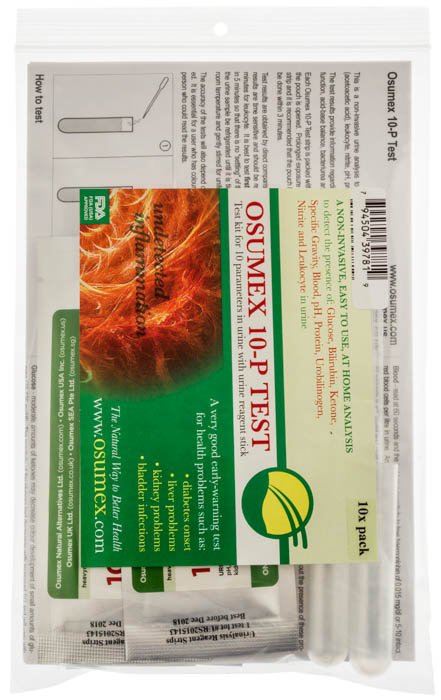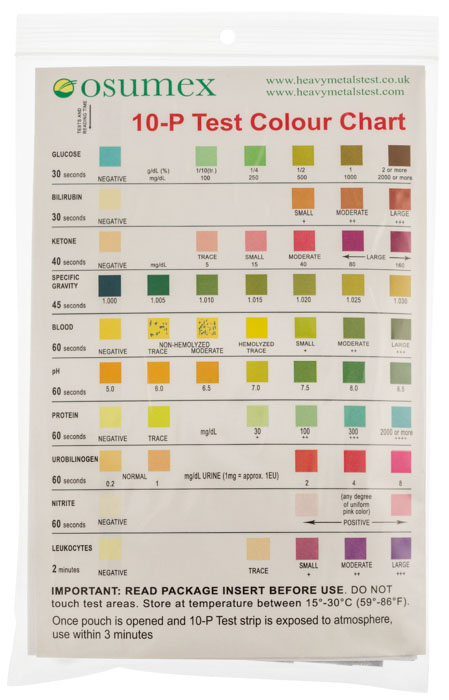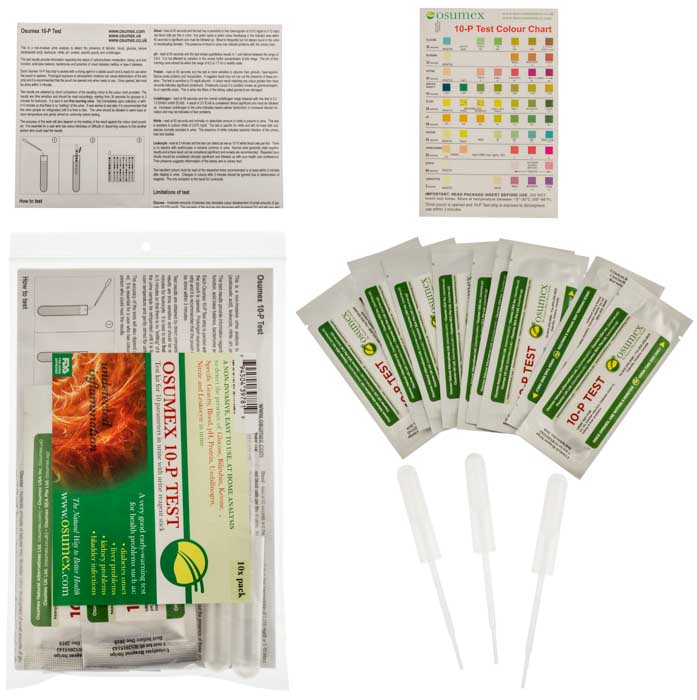|
| 10-P results interpretation |
|
|
|
Click below for other Metal Test kits |
|
Osumex 10P Urine Analysis
The 10 Parameters measured by the 10-P Test are as follows:
- Glucose
Small amounts are normally excreted by the kidney but if found consistently may be significant. Glucose in urine is a sign of
"uncontrolled diabetes" and should be followed up with more tests to confirm. If left unchecked or steps taken
with the guidance of a helath care professional, it could lead to onset adult diabetes or type-2 diabetes with serious health consequences.
- Biliburin
The test is specific for bilirubin in urine. Even trace amounts are considered abnormal and require further investigation. Normally
bilirubin should not be found in urine. Bilirubin is a breakdown product of haemoglobin and its presence may suggest
liver or gall bladder dysfunction
- Ketone
Normally no ketones are present in urine although detectable levels may be found during physiological stress conditions such as fasting,
pregnancy, strenuous exercise, starvation diets, and other abnormal carbohydrate metabolism situations. Ketones are produced when fatty acids
are broken down for energy by the body. Their presence suggests that the body is burning fat and high levels may indicate ketosis. Ketosis
is not a harmful state but may cause pH to become more acidic.
- Specific Gravity
Twenty four hour urine from normal adults with normal diets and normal fluid intake will have a SG of 0.016 - 1.022. In severe renal damage
the SG is fixed at 1.010 which is the value of glomerular filtrate.
- Blood
Blood is frequently but not always found in the urine of menstruating females. The consistent presence of blood in urine may indicate
problems with the urinary tract
- pH
The pH of first morning urine should be within the range of 6.5 to 7.5 for a healthy state.
- Protein
Protein should not be found in urine. A colour result matching any colour greater than trace amounts indicates significant proteinuria.
Proteinuria occurs if a condition known as glomerulonephritis or nephritis exists. This is when the
filters of the kidney called glomeruli are damaged. It is a serious condition leading to renal failure and must
be checked immediately.
- Urobilinogen
A result of 2.0 EU/dl is considered clinical significant and must be followed up. Increased urobilinogen in the urine indicates
hepato-cellular dysfunction or increased bilirubin formation and may be indicative of liver problems
- Nitrite
The test is specific for nitrite and will not react with substances normally excreted in urine. The presence of nitrite suggests
bacterial infection of the urinary tract and bladder
- Leukocyte
Normal urine generally yield negative results and a trace result can be considered significant and re-tests are recommended. Repeated trace
results should be considered clinically significant and followed up with your health care professional. Their presence suggests
inflammation of the kidney and or urinary tract
Each Osumex 10-P Test kit consists of a test-tube, a strip contained in a pouch, colour chart to check results of the test and an insert
on usage and information. Please see images below.



Click here for full size 10-P Test chart

The above information is provided for general
educational purposes only. It is not intended to replace competent
health care advice received from a knowledgeable healthcare professional.
You are urged to seek healthcare advice for the treatment of any
illness or disease.
The Food Standard Agency UK has not evaluated these
statements. This product is not intended to diagnose, treat, cure, or prevent
any disease.
|


